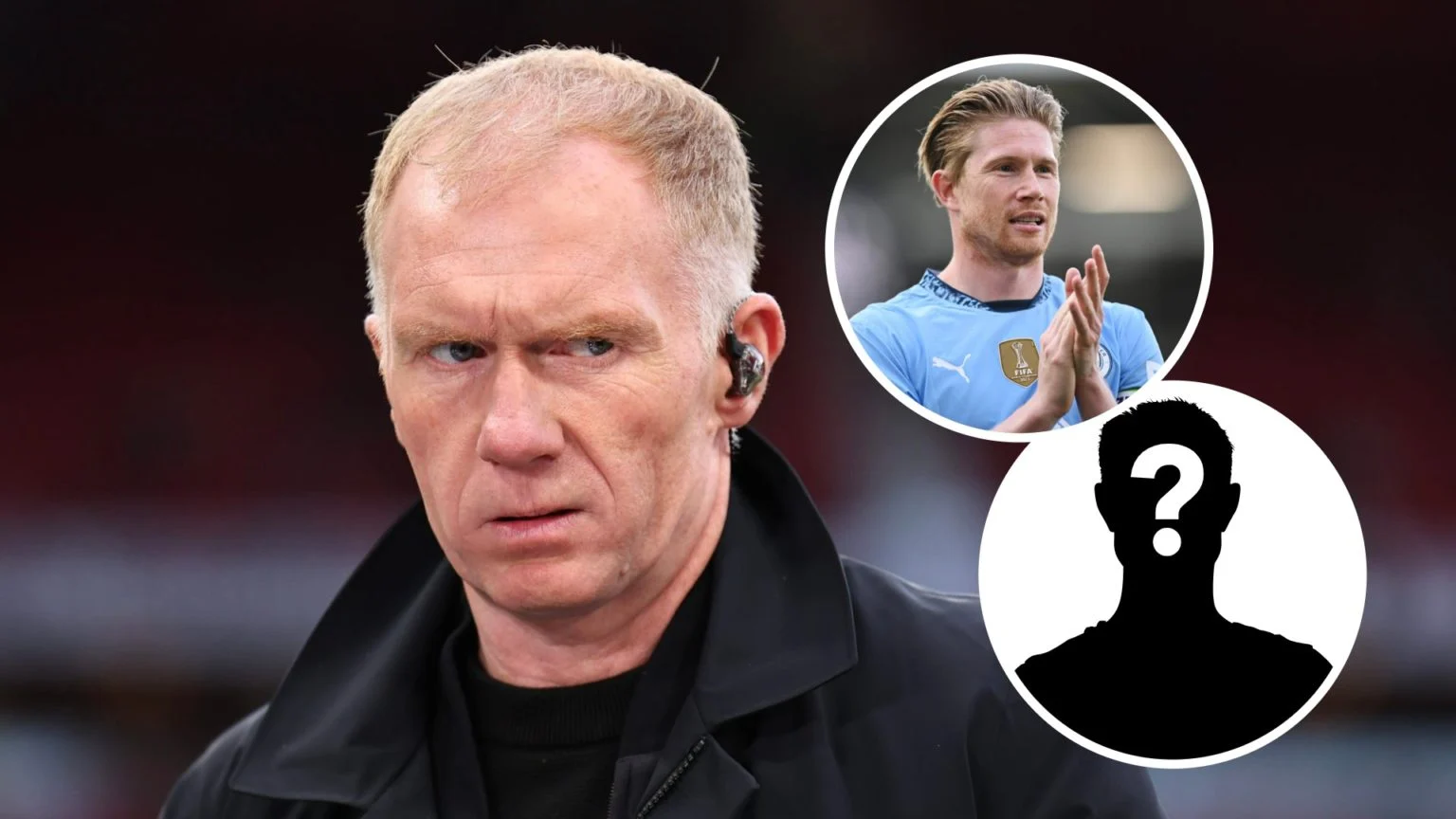Paul Scholes names a former Man City midfielder who was better than Kevin De Bruyne

The summer of 2025 marked the end of an era at Manchester City as Kevin De Bruyne’s remarkable 10-year journey at the Etihad Stadium came to a close. The Belgian maestro, who arrived from Wolfsburg in 2015 with a point to prove after his disappointing stint at Chelsea, had transformed into one of the Premier League’s most decorated and influential players. His departure has sparked intense debate about his legacy and whether he truly deserves the title of Manchester City’s greatest ever player.
De Bruyne’s statistics speak volumes about his impact on the sky blue half of Manchester. Across 422 appearances, he contributed 108 goals and 177 assists, numbers that reflect not just his individual brilliance but his ability to elevate those around him. His trophy cabinet tells the story of Manchester City’s golden era: six Premier League titles, multiple domestic cups, and the crowning glory of the Champions League triumph. These achievements have led many, including current City star Bernardo Silva, to label De Bruyne as the club’s greatest player of all time.
However, this seemingly unanimous verdict has found an unlikely dissenter in Paul Scholes, the Manchester United legend whose opinion carries significant weight in football circles. Scholes, speaking to TNT Sports, has thrown his support behind another City legend: David Silva, the Spanish magician who graced the Etihad Stadium for a decade before De Bruyne’s arrival.
The Case for David Silva: Technical Brilliance and Pioneering Spirit
David Silva’s arrival at Manchester City in 2010 for £30 million from Valencia represented a watershed moment in the club’s history. The diminutive Spaniard arrived at a time when City were still establishing themselves as a force in English football, and his impact was immediate and transformative. Silva didn’t just bring technical ability; he brought a philosophy of play that would become synonymous with Manchester City’s identity under successive managers.
Paul Scholes’ endorsement of Silva carries particular significance given his own illustrious career as a midfielder. Few players in football history can claim to understand the nuances of midfield play better than Scholes, who spent his entire career orchestrating Manchester United’s play from the center of the park. His assessment of Silva as City’s greatest ever player is not made lightly but comes from a deep appreciation of what the Spaniard brought to English football.
Silva’s game was built on subtlety rather than spectacle. Where modern football often celebrates power and pace, Silva championed precision and intelligence. His ability to find space in the tightest of areas, combined with his vision to pick out passes that others couldn’t even see, made him a unique proposition in the Premier League. He operated in the pockets of space between the lines, drawing defenders out of position and creating opportunities for his teammates with an almost telepathic understanding of the game.
The Spanish international’s 436 appearances for Manchester City tell the story of remarkable consistency and longevity. Over his decade at the club, he scored 77 goals and provided 136 assists, contributing to four Premier League title wins. While these numbers might seem modest compared to De Bruyne’s output, they don’t fully capture Silva’s influence on the team’s play. His contributions often came in the form of the pass before the assist, the movement that created space for others, or the retention of possession in crucial moments.
Silva’s technical ability was perhaps unmatched in the Premier League during his peak years. His first touch was sublime, his passing range extensive, and his dribbling ability allowed him to glide past defenders with an almost casual elegance. He possessed the rare quality of making the difficult look effortless, a trait that endeared him to purists of the game like Scholes.
Kevin De Bruyne: The Modern Maestro
Kevin De Bruyne’s arrival at Manchester City in 2015 represented the club’s continued evolution toward becoming a global powerhouse. The Belgian had experienced the disappointment of failing to establish himself at Chelsea, but his time in Germany with Wolfsburg had honed his skills and prepared him for the challenges of returning to English football. His second coming to the Premier League was nothing short of spectacular.
De Bruyne’s playing style differed markedly from Silva’s approach. Where Silva was subtle and intricate, De Bruyne was direct and explosive. His ability to strike the ball with power and precision from distance became legendary, while his crossing ability from wide positions redefined what was possible from those areas of the pitch. The Belgian’s physical attributes complemented his technical skills perfectly, allowing him to dominate matches in a way that few midfielders could match.
The statistics that define De Bruyne’s Manchester City career are extraordinary by any measure. His 108 goals from midfield demonstrate a clinical finishing ability that separated him from most players in his position. More impressively, his 177 assists showcase his vision and creativity, highlighting his ability to consistently create scoring opportunities for his teammates. These numbers become even more remarkable when considering that he achieved them while playing in one of the most competitive leagues in world football.
De Bruyne’s influence extended beyond individual statistics to the team’s overall success. His six Premier League titles represent the most successful period in Manchester City’s history, and his performances in crucial moments often proved decisive. The Belgian’s ability to rise to the occasion in big matches, whether domestic or European, became a defining characteristic of his career. His leadership qualities, despite not always wearing the captain’s armband, made him an indispensable figure in the dressing room.
The Belgian’s versatility also set him apart from many of his contemporaries. While primarily deployed as an attacking midfielder, De Bruyne’s tactical intelligence allowed him to adapt to various positions and systems. Whether playing as a traditional number 10, operating from wide positions, or even dropping deeper to orchestrate play, he maintained his effectiveness and influence on the game.
The Statistical Comparison: Numbers Tell a Story
When examining the careers of both players at Manchester City, the statistical comparison reveals interesting insights into their different approaches to the game. De Bruyne’s 422 appearances resulted in 108 goals and 177 assists, giving him an average of 0.26 goals per game and 0.42 assists per game. Silva’s 436 appearances yielded 77 goals and 136 assists, translating to 0.18 goals per game and 0.31 assists per game.
These figures suggest that De Bruyne was more directly involved in goal-scoring situations, both as a scorer and creator. His superior assist numbers reflect his ability to consistently find the final pass, while his higher goal tally demonstrates his threat from various positions on the pitch. However, statistics alone don’t capture the full picture of a player’s influence on the team.
Silva’s lower numbers in direct goal contributions don’t diminish his importance to Manchester City’s success. His role often involved the less glamorous aspects of midfield play: maintaining possession, dictating tempo, and creating the platform for others to excel. These contributions, while not always reflected in traditional statistics, were crucial to the team’s overall performance and tactical setup.
The trophy comparison between the two players also reveals interesting dynamics. De Bruyne’s six Premier League titles compared to Silva’s four might suggest superior success, but this overlooks the context of their respective eras. Silva’s titles came during City’s initial emergence as a dominant force, while De Bruyne’s success occurred during the club’s sustained period of excellence under Pep Guardiola.
Paul Scholes’ Perspective: The Voice of Experience
Paul Scholes’ opinion on this debate carries particular weight due to his own experiences as a central midfielder at the highest level. Throughout his career at Manchester United, Scholes demonstrated many of the qualities that he admires in David Silva: technical excellence, tactical intelligence, and the ability to influence games through subtle interventions rather than spectacular moments.
Scholes’ appreciation for Silva likely stems from recognizing similar qualities in the Spaniard that defined his own playing style. Both players possessed exceptional passing ability, could control the tempo of matches, and had the intelligence to position themselves effectively on the pitch. Their understanding of space and timing separated them from many of their contemporaries.
The Manchester United legend’s assessment also reflects a broader philosophical divide in how football is appreciated. Scholes represents a generation that valued technical ability and football intelligence above athleticism and spectacle. His preference for Silva over De Bruyne might be seen as championing these traditional values in an era where the game has become increasingly focused on physical attributes and direct contributions.
However, Scholes’ opinion is not based solely on nostalgia or philosophical preferences. His tactical understanding of the game allows him to appreciate the different ways players can influence matches. He recognizes that Silva’s contributions often came in forms that don’t appear in highlight reels but were fundamental to team success.
The Broader Context: Different Eras, Different Challenges
The debate between Silva and De Bruyne as Manchester City’s greatest player must be understood within the context of their respective eras at the club. Silva arrived during City’s transition from ambitious newcomers to established contenders, while De Bruyne joined a team that was already accustomed to success and had developed a winning mentality.
Silva’s early years at City coincided with the club’s first taste of Premier League success under Roberto Mancini. His adaptation to English football and ability to perform consistently in a team still finding its identity were crucial to establishing City’s credentials. The Spaniard’s influence during this formative period cannot be overstated, as he helped set the standards and expectations that would define the club’s future success.
De Bruyne’s arrival came at a time when Manchester City had already established themselves as a major force in English football. However, his contributions came during the club’s most successful period, coinciding with Pep Guardiola’s appointment and the implementation of a playing style that maximized his abilities. The Belgian’s peak years aligned with City’s domestic dominance and European breakthrough.
The tactical evolution of Manchester City during these periods also influenced how both players’ contributions should be evaluated. Silva operated in systems that often required him to be the primary creative force, while De Bruyne benefited from playing in more structured setups that created multiple creative outlets. These different tactical contexts shaped their roles and, consequently, their statistical outputs.
Technical Analysis: Contrasting Styles
The technical aspects of both players’ games reveal why opinions on their relative merits can differ so significantly. Silva’s technique was characterized by its precision and economy of movement. His passing accuracy was consistently exceptional, and his ability to retain possession under pressure made him invaluable in tight matches. The Spaniard’s close control and dribbling ability allowed him to navigate congested areas of the pitch with remarkable ease.
De Bruyne’s technical profile was more varied and dynamic. His passing range was perhaps superior to Silva’s, with the Belgian capable of finding teammates from virtually any position on the pitch. His crossing ability, particularly from wide positions, was genuinely elite, while his shooting technique allowed him to score from distances that troubled goalkeepers consistently.
The physical aspects of their games also differed significantly. Silva’s slight build meant he had to rely on intelligence and technique to avoid physical confrontations, while De Bruyne’s more robust frame allowed him to compete physically with opponents. This difference in physical attributes influenced their playing styles and the types of contributions they made to the team.
Both players possessed exceptional vision, but they applied it differently. Silva’s vision was more intricate, often involving short passes that created space and opportunities through patient buildup play. De Bruyne’s vision was more direct, frequently resulting in ambitious passes that created immediate scoring chances.
The Legacy Question: Impact Beyond Statistics
When evaluating the legacy of both players, considerations extend beyond their statistical contributions to encompass their influence on Manchester City’s identity and playing philosophy. Silva’s legacy is intertwined with the club’s transformation from wealthy outsiders to established elite, while De Bruyne’s legacy is connected to their sustained dominance and European success.
Silva’s influence on Manchester City’s playing culture was profound. His professionalism, consistency, and technical excellence set standards that influenced teammates and successors. The respect he commanded from players, coaches, and fans created a template for how elite players should conduct themselves at the club.
De Bruyne’s legacy is perhaps more spectacular, defined by moments of individual brilliance that changed matches and seasons. His ability to produce magic in crucial moments has created a collection of memories that will endure long after his departure. The Belgian’s leadership during City’s most successful period has cemented his place in the club’s folklore.
The question of legacy also involves considering how each player’s career might be viewed in historical context. Silva’s pioneering role in establishing Manchester City’s modern identity might be seen as more historically significant, while De Bruyne’s peak performance levels might be remembered as the highest standard reached by any City player.
Current Perspectives: What the Football World Thinks
The debate between Silva and De Bruyne has generated considerable discussion within football circles, with opinions varying based on different criteria and personal preferences. Many current Manchester City players, including Bernardo Silva, have expressed their view that De Bruyne represents the club’s greatest ever player, citing his statistical achievements and impact during their most successful period.
However, other voices within the football community have echoed Paul Scholes’ preference for David Silva. These supporters often point to Silva’s technical superiority, his role in establishing City’s modern identity, and his consistency over a longer period as evidence of his greater overall contribution.
The generational divide in opinions is also notable, with younger fans who primarily witnessed De Bruyne’s peak years often favoring the Belgian, while those who followed Silva’s entire career tend to appreciate his more subtle contributions. This divide reflects broader changes in how football is consumed and appreciated in the modern era.
Former Manchester City players who played alongside both have generally avoided taking definitive positions, recognizing the different qualities each brought to the team. Their diplomatic approach reflects the genuine difficulty in comparing two players who excelled in different ways and different eras.
The Verdict: A Matter of Perspective
The debate between David Silva and Kevin De Bruyne as Manchester City’s greatest ever player ultimately comes down to personal preference and how one weighs different aspects of football excellence. Paul Scholes’ preference for Silva reflects an appreciation for technical purity and subtle influence, while those who favor De Bruyne often point to his superior statistical output and impact during City’s most successful period.
Both players transformed Manchester City in their own ways and at different stages of the club’s evolution. Silva’s contribution was foundational, establishing the technical standards and playing philosophy that enabled future success. De Bruyne’s contribution was more spectacular, providing the individual brilliance that elevated an already excellent team to unprecedented heights.
The beauty of this debate lies in its subjective nature. Football’s complexity means that different observers can legitimately reach different conclusions based on what they value most in a player’s contribution. Whether one prioritizes technical ability, statistical output, longevity, or historical significance will influence their position in this discussion.
Conclusion: Two Legends, One Legacy
As Manchester City continues to evolve and new stars emerge, the debate between David Silva and Kevin De Bruyne as the club’s greatest ever player will likely continue. Both players have earned their place in City folklore through their exceptional contributions, and both have valid claims to the title of greatest ever player.
Paul Scholes’ endorsement of David Silva should not be seen as diminishing Kevin De Bruyne’s achievements but rather as highlighting the different ways excellence can be expressed in football. Silva’s technical mastery and foundational role in City’s transformation represents one form of greatness, while De Bruyne’s statistical dominance and spectacular performances represent another.
The true legacy of both players might ultimately be found not in settling this debate but in recognizing that Manchester City has been fortunate to have two genuinely world-class players who defined different eras of the club’s history. Their combined contributions have helped establish Manchester City as one of the world’s elite football clubs, and their influence will be felt long after the current generation of fans has moved on.
In the end, perhaps the greatest testament to both players is that this debate exists at all. Few clubs can claim to have had two midfielders of such exceptional quality that comparing them becomes a genuine challenge. Whether one agrees with Paul Scholes’ assessment or prefers the statistical argument for Kevin De Bruyne, both players have earned their place among Manchester City’s greatest ever servants, and their legacies will endure as long as football is played at the Etihad Stadium.















